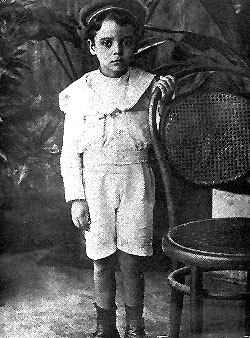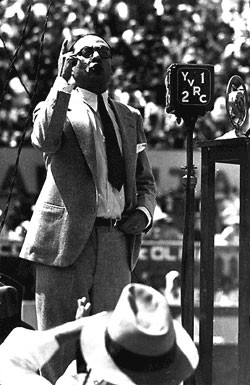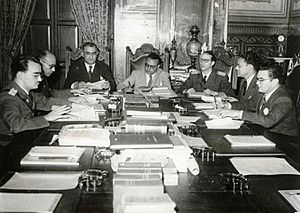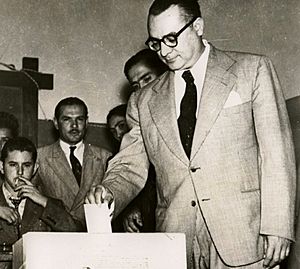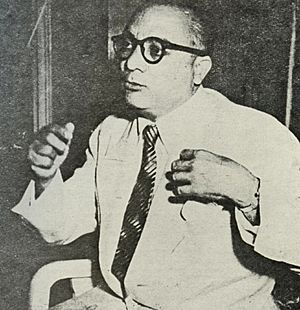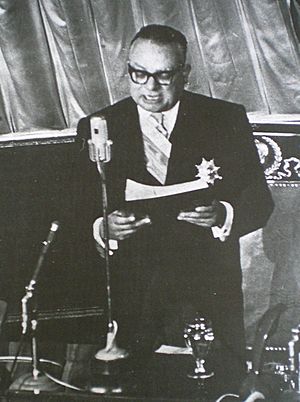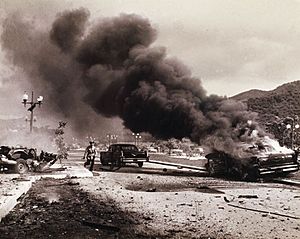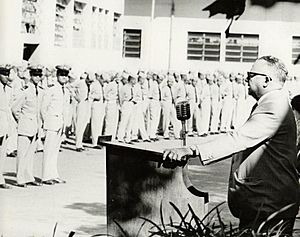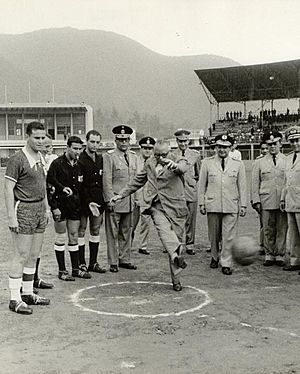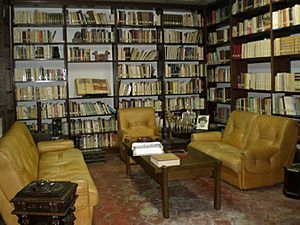Rómulo Betancourt facts for kids
Quick facts for kids
Rómulo Betancourt
|
|
|---|---|
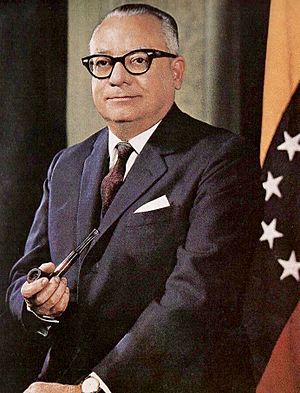 |
|
| President of Venezuela | |
| In office 13 February 1959 – 13 March 1964 |
|
| Preceded by | Edgar Sanabria |
| Succeeded by | Raúl Leoni |
| In office 19 October 1945 – 17 February 1948 |
|
| Preceded by | Isaías Medina Angarita |
| Succeeded by | Rómulo Gallegos |
| Senator for life | |
| In office 14 March 1964 – 28 September 1981 |
|
| Personal details | |
| Born |
Rómulo Ernesto Betancourt Bello
22 February 1908 Guatire, Miranda state, Venezuela |
| Died | 28 September 1981 (aged 73) New York City, United States |
| Resting place | East Cemetery (Venezuela) |
| Political party | Democratic Action |
| Spouses |
Carmen Valverde
(divorced)Renée Hartmann Viso |
| Children | 1 |
| Alma mater | Central University of Venezuela |
| Signature | |
Rómulo Ernesto Betancourt Bello (born February 22, 1908 – died September 28, 1981) was a very important leader in Venezuela. He is often called "The Father of Venezuelan Democracy." He served as the president of Venezuela two times: first from 1945 to 1948, and again from 1959 to 1964. He also led Acción Democrática, a major political party in Venezuela during the 20th century.
Betancourt had a challenging but impactful career in Latin American politics. He was forced to leave Venezuela several times, living in different countries like the United States. These experiences helped him become a well-known international leader. Many people see him as the Founding Father of modern, democratic Venezuela.
Contents
Early Life and Political Beginnings
Rómulo Betancourt was born in Guatire, a town close to Caracas. His parents were Luis Betancourt Bello and Virginia Bello Milano. He went to school in Guatire and then high school in Caracas. He later studied law at the Central University of Venezuela.
As a young man, he was involved in student politics. This led to him being sent away from Venezuela. He moved to Costa Rica, where he helped start student groups. In 1937, he returned to Venezuela and founded the Partido Democrático Nacional. This party later became the official political party called Acción Democrática (AD) in 1941.
First Time as President (1945-1948)
Betancourt became president in 1945 after a military coup. During his time in office, he achieved many important things. He made sure that everyone could vote, which was a big step for democracy. He also introduced social reforms to help people.
One of his biggest achievements was changing how foreign oil companies shared their profits with Venezuela. He made sure Venezuela received half of the profits from oil. His government also worked with the International Refugee Organization to help European refugees after World War II.
Changes to the Oil Industry
Before Betancourt, Venezuela received only a small part of the money from its oil. Foreign oil companies made most of the profit. Betancourt changed the law to "Fifty to Fifty," meaning Venezuela would get half of the profits.
At first, Betancourt wanted to take full control of the oil industry for Venezuela. This is called nationalization. However, Venezuela's economy was not strong enough to handle it if foreign companies stopped buying their oil.
Instead, Betancourt's government increased taxes on oil production. This achieved a similar goal: making sure Venezuela's oil wealth benefited its own people. In the late 1940s, Venezuela was producing a lot of oil. This oil was very important for the Allies during World War II, especially for countries fighting in Europe. Betancourt used this importance to Venezuela's advantage, making it a key player on the world stage.
Betancourt believed that higher taxes were just as good as nationalizing the oil industry. He said, "Tax income was increased from then to such a degree that nationalization was unnecessary to obtain maximum economic benefits for the people of the country." Oil companies had to agree to better conditions for workers. As a result, labor unions strongly supported Betancourt's government. In 1946, 500 new labor unions were created. His government also stopped the old system of giving out oil concessions and started developing refineries inside Venezuela.
Third Time in Exile
In 1947, Betancourt oversaw Venezuela's first free elections. Rómulo Gallegos won, but a military coup overthrew him in 1948. Betancourt was forced to leave Venezuela again and went to New York City.
While in exile, he planned his return to politics. He believed in democratic principles and open elections. He wanted to show the world the problems of dictatorships in Venezuela. During this time, he wrote a book called Venezuela: Oil and Politics. This book was banned in Venezuela, but Betancourt continued his work.
Second Time as President (1959-1964)
Ten years later, after the dictator Pérez Jiménez was removed, Betancourt was elected president again in 1958. He became the first leader of the Punto Fijo Pact, an agreement to ensure democracy. Even though oil prices were low, Betancourt managed to make Venezuela financially stable again.
In 1960, two important organizations were created by Juan Pablo Pérez Alfonso, Betancourt's minister for oil. One was the Venezuelan Petroleum Corporation (CVP), which oversaw the national oil industry. The other was the Organization of the Petroleum Exporting Countries (OPEC). Venezuela started OPEC with Kuwait, Saudi Arabia, Iraq, and Iran. This was a very new idea at the time, but Betancourt saw it as vital for Venezuela's independence and financial strength.
This idea for OPEC came about after the U.S. President Dwight D. Eisenhower put limits on Venezuelan oil imports in 1960. Betancourt wanted to protect Venezuela's oil industry. He formed an alliance with other oil-producing countries to work together. This strong connection between Venezuela and OPEC countries continues today.
Betancourt's government also worked to develop industries in Venezuela. They wanted to make goods locally instead of importing them. They built many roads and power plants, like the first phase of the Guri Dam. These projects helped modernize Venezuela.
Helping Farmers and Land Reform
Betancourt's government also started a land reform program. They gave unproductive private lands and public lands to farmers. This helped increase agricultural production. Landowners whose properties were used for this reform received fair payment.
Dealing with Challenges
Betancourt faced strong opposition from extreme groups and rebellious army units. However, he kept working for economic and education reforms. Some groups formed a communist guerrilla army called the Armed Forces for National Liberation (FALN) to fight his government. They carried out attacks, like damaging oil pipelines and bombing the U.S. Embassy.
It became clear that Fidel Castro from Cuba was arming these rebels. Venezuela protested this to the Organization of American States (OAS).
Surviving an Assassination Attempt
Betancourt had spoken out against the dictator of the Dominican Republic, Rafael Trujillo. Trujillo hated Betancourt and tried many times to overthrow him. Venezuela took its case against Trujillo to the Organization of American States, trying to solve the problem peacefully. This made Trujillo even angrier, and he ordered his agents to kill Betancourt in Caracas.
On June 24, 1960, a car bomb exploded as Betancourt's presidential car drove by. Betancourt was badly burned, and his head of security was killed. The driver was also severely injured and later died. Photos of a wounded but alive Betancourt were shared worldwide. This event made people around the world angry at Trujillo and helped to weaken his power. Betancourt's survival made him even more respected by the public.
1963 Elections and Democratic Legacy
One of Betancourt's greatest achievements was the successful election in 1963. Despite threats to stop the process, almost 90 percent of voters participated. On March 11, 1964, Venezuela made history. For the first time, the presidential power was passed from one democratically elected leader to another. Before Betancourt, presidents were usually chosen by Congress.
He was Venezuela's first democratically elected president to finish his full term. He was followed by Raúl Leoni. Rómulo Betancourt set a strong democratic example for Venezuela, a country that had been ruled by dictators for much of its history. He created a political model based on popular vote that lasted for many years.
The Betancourt Doctrine
Betancourt strongly disliked non-democratic governments. This led to the "Betancourt Doctrine." This policy meant Venezuela would not recognize any government, whether left or right, that came to power through military force. Betancourt always stood up for democratic values in Latin America. This often put him against military leaders in the region.
During the Cuban Missile Crisis between the United States and Cuba, President Kennedy and President Betancourt became very close. They even had a direct phone line between the White House and the Venezuelan Presidential Palace. Betancourt's daughter, Virginia Betancourt Valverde, often helped translate their conversations.
Later, President Rafael Caldera moved away from this doctrine, believing it isolated Venezuela. However, many still see Betancourt as a brave defender of democracy.
Later Life
In 1964, Betancourt was given a lifetime seat in Venezuela's senate because he was a former president. His last years were spent writing and with his wife, Dr. Renee Hartmann. He passed away on September 28, 1981, in New York City.
Personal Life
Betancourt was married to Carmen Valverde, who was the First Lady of Venezuela during his presidencies. Virginia Betancourt Valverde was their only child. After divorcing, he married Dr. Renee Hartmann.
Rómulo Betancourt was a close friend of Luis Muñoz Marín, the governor of Puerto Rico. They often discussed politics. Betancourt attended his friend's funeral in 1980.
Books About Rómulo Betancourt
- Venezuela: Oil & Politics; 1978; by Rómulo Betancourt; ISBN: 0-395-27945-3
- Rómulo Betancourt; 1977; by Manuel Caballero
- Rómulo y Yo; 1984; by Renée Hartmann; ISBN: 84-253-1625-1
- Mi Abuelo Rómulo; 2013; by Alvaro Pérez Betancourt and Claudia González Gamboa; ISBN: 978-980408-022-7
See also
 In Spanish: Rómulo Betancourt para niños
In Spanish: Rómulo Betancourt para niños
- Presidents of Venezuela
- List of Venezuelans
 | John T. Biggers |
 | Thomas Blackshear |
 | Mark Bradford |
 | Beverly Buchanan |


